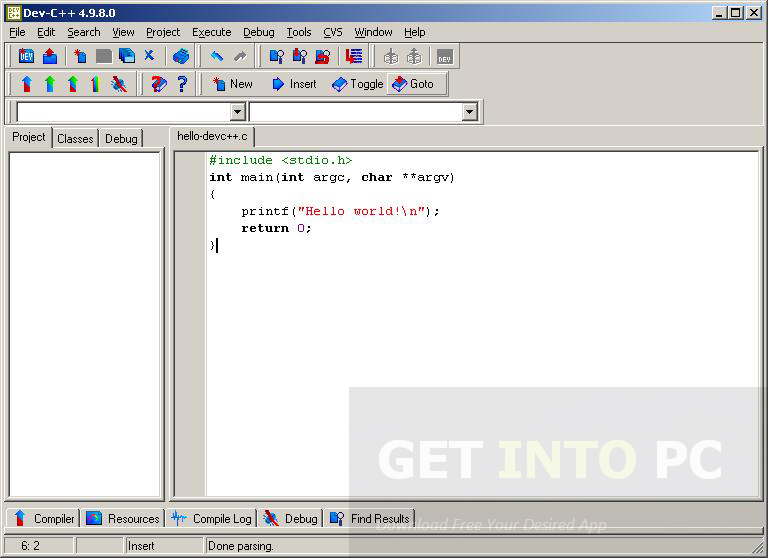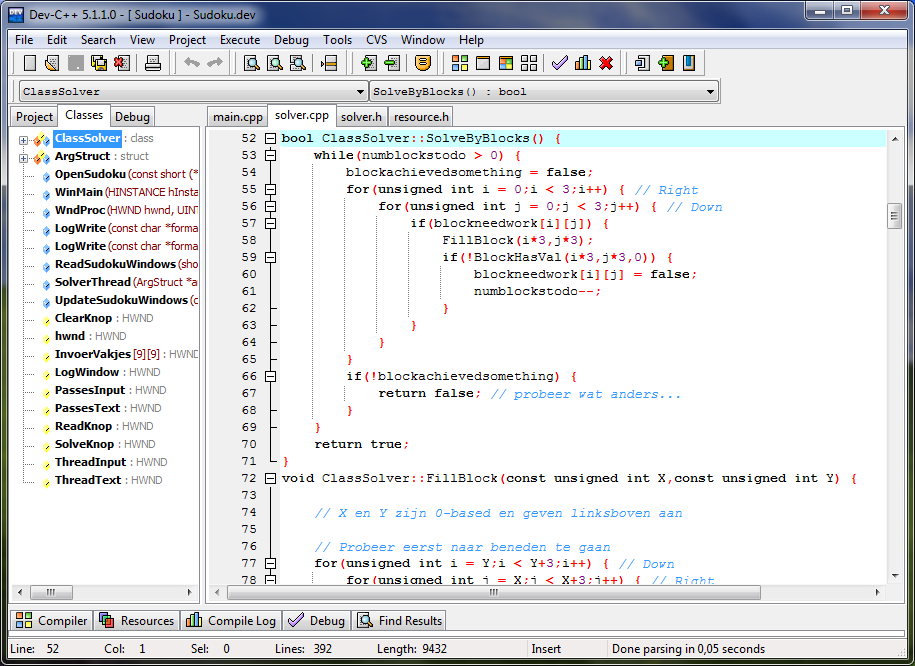-->
The #define creates a macro, which is the association of an identifier or parameterized identifier with a token string. After the macro is defined, the compiler can substitute the token string for each occurrence of the identifier in the source file.
Orwell Dev-C is a full-featured Integrated Development Environment (IDE) for the C/C programming language. It uses Mingw port of GCC (GNU Compiler Collection) as its compiler. It creates native Win32 executables, either console or GUI. Orwell Dev-C can also be used in combination with Cygwin.
- Check that in dev-C tools compiler options directories c includes and c includes have the path to 'c: dev-c includes' include #include at the top of my file compiled.
- Apr 22, 2013 Dev-C development packages provide C/C programmers using the Dev-C IDE with an ease of installation for various useful libraries and tools.!!!!! The currently only active admins are mol1111 and laserlight, please do not contact other listed ad.
Syntax
#defineidentifiertoken-stringopt
#defineidentifier(identifieropt, ... ,identifieropt)token-stringopt
Remarks
The #define directive causes the compiler to substitute token-string for each occurrence of identifier in the source file. The identifier is replaced only when it forms a token. That is, identifier is not replaced if it appears in a comment, in a string, or as part of a longer identifier. For more information, see Tokens.
The token-string argument consists of a series of tokens, such as keywords, constants, or complete statements. One or more white-space characters must separate token-string from identifier. This white space is not considered part of the substituted text, nor is any white space that follows the last token of the text.
A #define without a token-string removes occurrences of identifier from the source file. The identifier remains defined and can be tested by using the #if defined and #ifdef directives.
The second syntax form defines a function-like macro with parameters. This form accepts an optional list of parameters that must appear in parentheses. After the macro is defined, each subsequent occurrence of identifier( identifieropt, ..., identifieropt ) is replaced with a version of the token-string argument that has actual arguments substituted for formal parameters.

Formal parameter names appear in token-string to mark the locations where actual values are substituted. Each parameter name can appear multiple times in token-string, and the names can appear in any order. The number of arguments in the call must match the number of parameters in the macro definition. Liberal use of parentheses guarantees that complex actual arguments are interpreted correctly.
The formal parameters in the list are separated by commas. Each name in the list must be unique, and the list must be enclosed in parentheses. No spaces can separate identifier and the opening parenthesis. Use line concatenation — place a backslash () immediately before the newline character — for long directives on multiple source lines. The scope of a formal parameter name extends to the new line that ends token-string.
When a macro has been defined in the second syntax form, subsequent textual instances followed by an argument list indicate a macro call. The actual arguments that follows an instance of identifier in the source file are matched to the corresponding formal parameters in the macro definition. Each formal parameter in token-string that is not preceded by a stringizing (#), charizing (#@), or token-pasting (##) operator, or not followed by a ## operator, is replaced by the corresponding actual argument. Any macros in the actual argument are expanded before the directive replaces the formal parameter. (The operators are described in Preprocessor operators.)
The following examples of macros with arguments illustrate the second form of the #define syntax:
Arguments with side effects sometimes cause macros to produce unexpected results. A given formal parameter may appear more than one time in token-string. If that formal parameter is replaced by an expression with side effects, the expression, with its side effects, may be evaluated more than one time. (See the examples under Token-Pasting Operator (##).)


Dev Cpp C++11
The #undef directive causes an identifier's preprocessor definition to be forgotten. See The #undef Directive for more information.
If the name of the macro being defined occurs in token-string (even as a result of another macro expansion), it is not expanded.
A second #define for a macro with the same name generates a warning unless the second token sequence is identical to the first.
Microsoft Specific
Microsoft C/C++ lets you redefine a macro if the new definition is syntactically identical to the original definition. In other words, the two definitions can have different parameter names. This behavior differs from ANSI C, which requires that the two definitions be lexically identical.
For example, the following two macros are identical except for the parameter names. ANSI C does not allow such a redefinition, but Microsoft C/C++ compiles it without error.
On the other hand, the following two macros are not identical and will generate a warning in Microsoft C/C++.
END Microsoft Specific
This example illustrates the #define directive:
The first statement defines the identifier WIDTH as the integer constant 80 and defines LENGTH in terms of WIDTH and the integer constant 10. Each occurrence of LENGTH is replaced by (WIDTH + 10). In turn, each occurrence of WIDTH + 10 is replaced by the expression (80 + 10). The parentheses around WIDTH + 10 are important because they control the interpretation in statements such as the following:
After the preprocessing stage the statement becomes:
which evaluates to 1800. Without parentheses, the result is:
which evaluates to 280.
Microsoft Specific
Defining macros and constants with the /D compiler option has the same effect as using a #define preprocessing directive at the start of your file. Up to 30 macros can be defined by using the /D option.
END Microsoft Specific
See also
Latest Version:
DEV-C++ 5.11 LATEST
Requirements:
Windows XP / Vista / Windows 7 / Windows 8 / Windows 10
Author / Product:
Bloodshed Software / DEV-C++
Old Versions:
Filename:
Dev-Cpp 5.11 TDM-GCC 4.9.2 Setup.exe
MD5 Checksum:
581d2ec5eff634a610705d01ec6da553
Details:
DEV-C++ 2020 full offline installer setup for PC 32bit/64bit
The app is an open-source IDE environment, offering software solutions and the necessary tools for C++ app development. However, be aware that its toolset is focused more on novices and basic programming, and that open source community has not updated its toolset for a considerable time. Still, what is present in its latest version represents a highly-capable C++ IDE that could be used for years without encountering any issue.
If you are a novice, are a student who wants to create C++ project in a stable and easy to use software environment, or even if you are a seasoned programmer who wants to access C++ programming inside small IDE that will not strain your computer resources, DEV-C++ represents a perfect choice. It has all the required tools and feature sets for creating small to mid-sized apps.
It runs on all modern versions of Windows and can be used without any restrictions for free. It was originally developed as an open-source fork of the Bloodshed Dev-C++ IDE.
Dev Cpp Compiler For Windows 7
Installation and Use
Even though DEV-C++ is filled with advanced compiler, debugger and a wide array of dev tools, it’s installation package is quite small (only around 50 MB) and therefore can be easily installed on any modern Windows PC or laptop. Just follow the onscreen instructions, and in mere seconds DEV C plus plus will be ready for running. Other more developed modern IDE environments, on the other hand, require much more storage space, and their installation can run for minutes.
Once up and running, you will be welcomed in a user-friendly interface that can be additionally customized to better fit your needs. The main window of the app follows the basic structure of many other modern IDE environments, with top row of dropdown menus and buttons that are shortcuts to its many built-in tools, a large vertical three-tabbed area for managing Projects, Classes and Debug listings, and of course, the main project area (with support for tabs) where you can start programming your apps. Both the app and the current project can be customized extensively. App Options window features tabs for Genera, Fonts, Colors, Code Insertion, Class Browsing, and Autosave customizations. Environment Options feature tabs for General, Directories, External Programs, File Associations, and CVS support customization.
Features and Highlights
Dev Cpp For Windows 8
- Fully-featured IDE for developing C++ apps.
- User-friendly interface with many tools for managing project development.
- Resource-light and unobtrusive feature set.
- Focused on novices and mid-level programmers who want stability and reliability.
- Powerful compiler and debugger.
- Compatible with all the modern versions of Windows OS